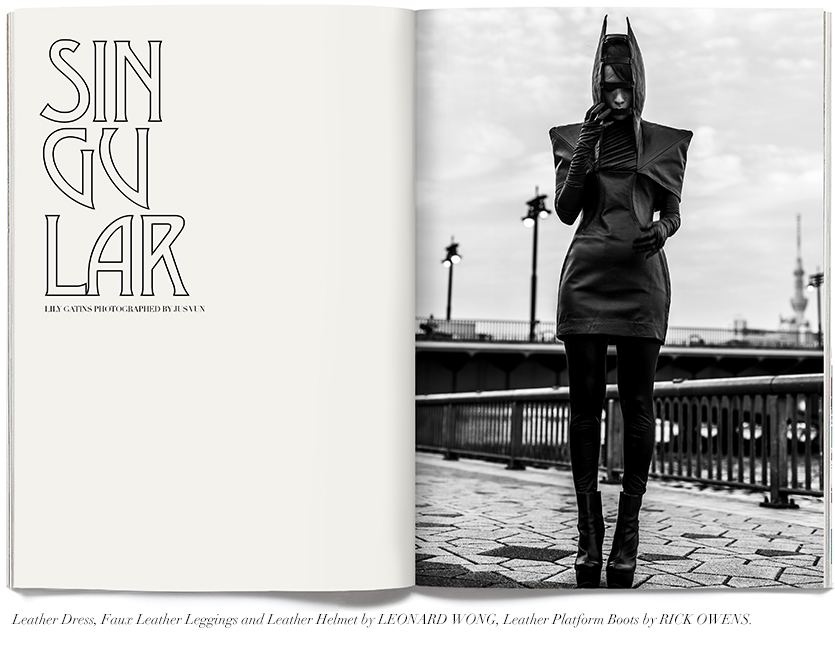
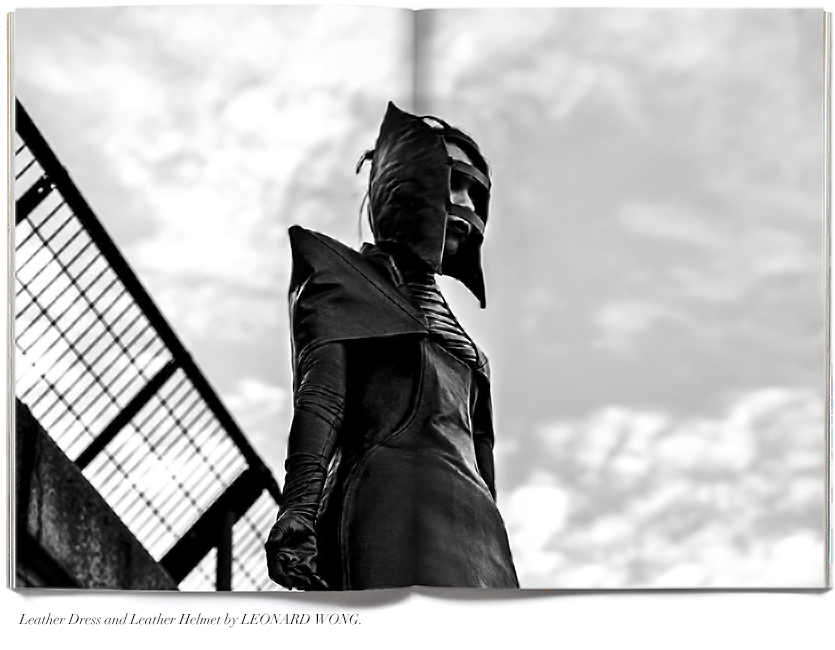
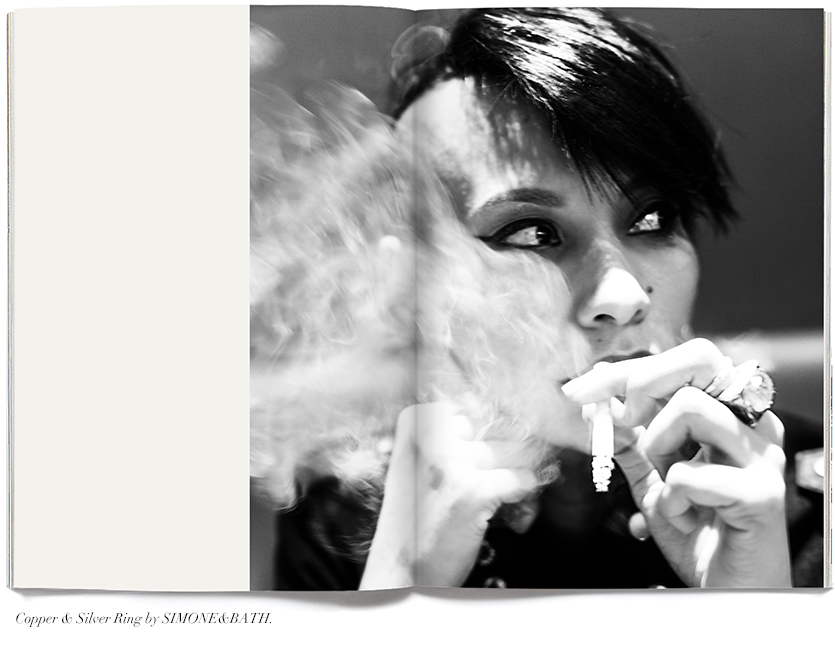
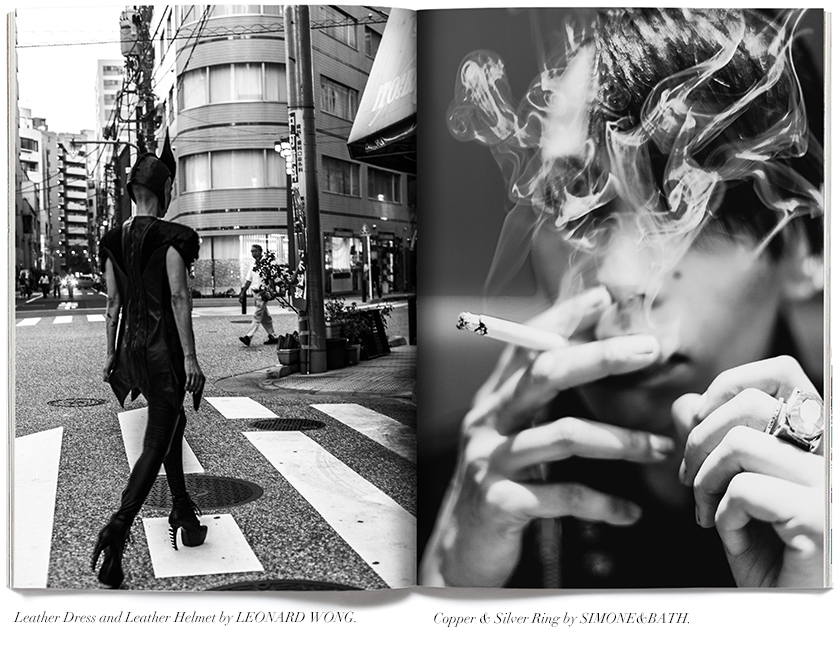
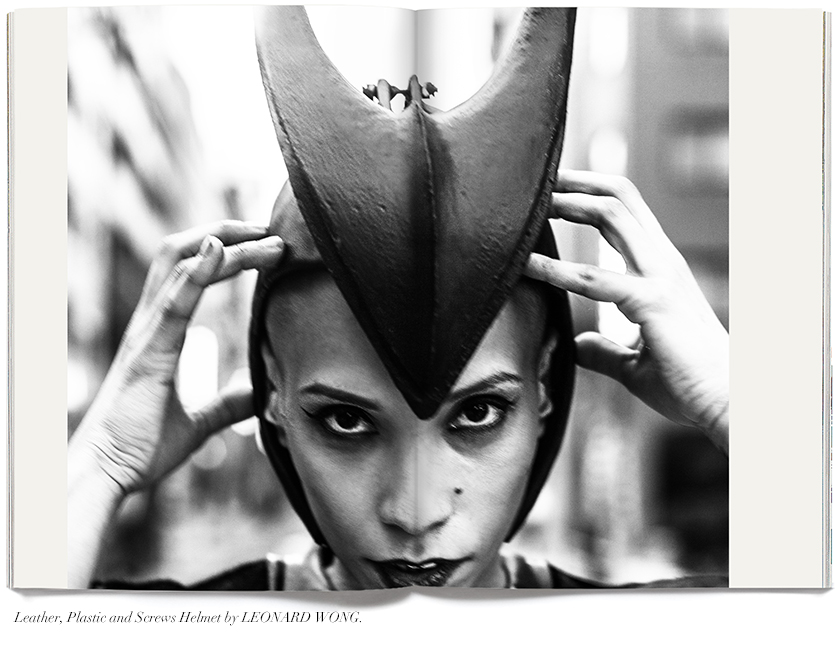
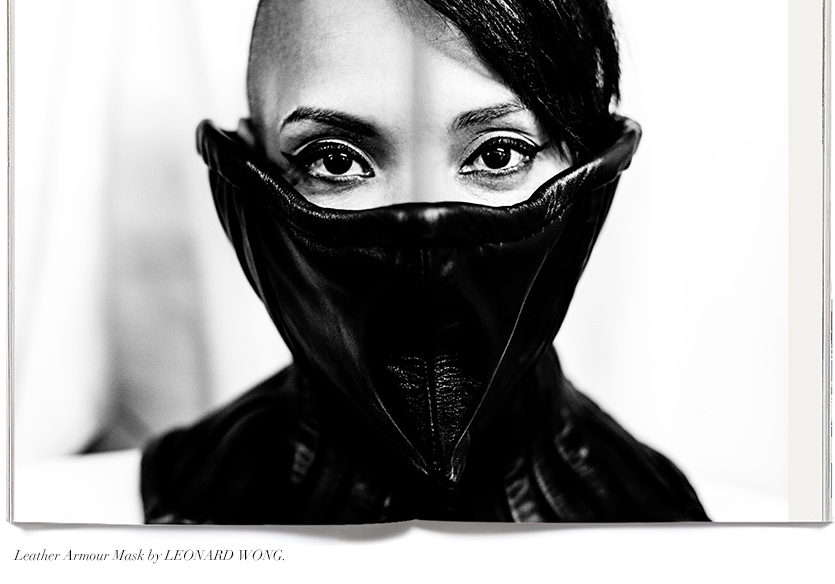
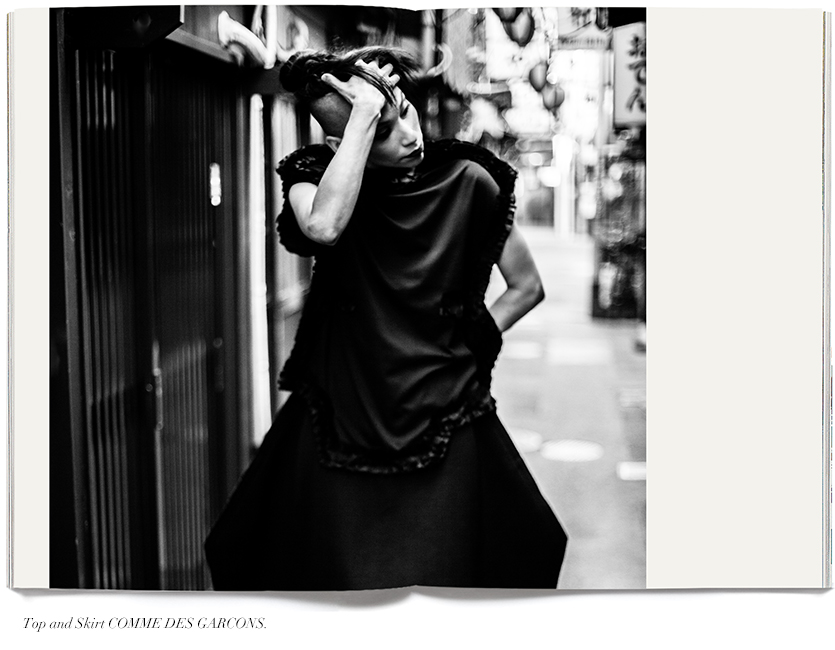
When I first met Mika Nakanishi a few years ago, I had only been a few months into purchasing my first ever DSLR camera. As I recall, it was perhaps around the beginning of 2009 or thereabouts. I was just a hobbyist and a complete beginner without a visual identity. She invited me to her friend’s exhibition, fetish photographer Yasuji Watanabe in Ginza. On the way there, we did a photoshoot with Ilford Delta 3200, raw and gritty and that was when she first introduced me to the beauty of grain on black and white film and the concept of push and pull.
I can say that not only is Mika one of the most important friends that I’ve had during my stay in Japan, but I credit her along with Tommy Oshima for inspiring me to try out film photography again (I had shot film in my youth but that was on simple P&S cameras). I admire her work; every piece has a story and you can get to know her thoughtfulness and sensitivity by simply looking through her images. Mika, I really appreciate you and I want to publicly thank you for your friendship.
Having been in the industry for over 10 years, Mika has some great advice and interesting thoughts on photography. I wanted to pick her brains and she was kind enough to allow me to share her thoughts with everyone.

1) How did you get into photography?
I’ve always been into photography… ever since I was a child. I used to like those P&S. I always had those around, taking photos of friends and parties. I really got into it when I was studying in New York and I took some night courses, black and white printing courses and thats when I first learnt how to process film and make my own prints and I think the whole process of making a photograph, processing and printing, that whole process is what got me into it. It’s not just about snapping a photo, taking a moment …you actually have control in the darkroom and you can make an image doing whatever u want in a darkroom and I think that’s what really pulled me into the whole interest.

2) After that you studied at ICP in NYC. Tell us about that experience.
It was very intense; a one year full-time program. Very intense. Great fun, met a lot of fun people who were all into photography we were all doing the same thing…(they were) very passionate. I think the year I spent at ICP, literally photography was on my mind 24-7. It was a great experience, because you are forced into the photography corner; you’re cornered into it. I learnt a lot, not really technically but I learnt to critique myself as well as other (people’s) work ..which is a great learning experience. Being able to talk about your work which has always been hard for me actually, and I still can’t.. but hearing others talk about your work and then talking about other (people’s) work you can really learn so much from that. It’s extremely hard (to analyze your own work) and the thing is, even after I started working professionally , the question I hated the most when I showed my portfolio to an editor or art director…(is) they will say “Ok , so what is your style?” I hated that question.

3) Tell us what you like to shoot
I like to shoot people…(but) I started shooting non-people. I started shooting what I like to call cityscapes. I’ve always lived in big cities so I was always drawn to weird everyday things but then gradually I started shooting people… and then friends that I hung out with in New York at the time, a lot of them were in the fashion industry ..so thats what pulled me into the fashion world of photography and some of us started doing test shoots and putting together fashion shoots… and basically what we did was we submitted them to magazines; you can do that in NY but I guess you can do it here too. So my first published work was on an online magazine called HINT magazine I don’t know if it’s still around but back then it was a well-known fashion online mag. We pitched our work, they published it and thats how I started. So now, I shoot portraits, fashion, I still shoot landscapes..I like to shoot , I think i prefer people. I like color, I love black and white as well..I’m started to get back into it.

4) Honestly, I definitely think that you have a certain style.
I guess so… I just don’t know it. It’s hard to explain. What are your colors, whats your style. I can’t really put into words. I know what I see, I have an image of what I want; the end result. I have the image but its hard to explain using words.
Models, portraits, I shot a lot of friends, everyone around me, whoever is interesting.
5) Do you recommend going to a school?
Not necessarily. There are a lot of great photographers who never went to school ; who are self-taught. I don’t know what I actually learnt at ICP… it was a learning experience because I was able to interact with fellow photographers ,artists but as far as going to school to learn techniques, I don’t know..yeah, it’s great if you have the time and money but I don’t think its necessary. It’s definitely for networking.

6) You split your time between NY, Tokyo and HK. Compare life, business and photography in these three places.
The business aspect is different but I don’t think it’s necessarily to do with the photo industry… any industry , the working environment in these three cities are different because it’s each culture is very different. I think New York and Hong Kong too, allows you more freedom to explore and challenge and try new things whereas Tokyo is a bit more conventional, you don’t have much freedom but that goes with any industry here.
7) How long has you been shooting professionally? How has your photography evolved through the years?
10 years. I think I’m quicker in seeing what I like. Definitely speed because I know what I like. I know what I’m looking for. Maybe I’m better now as opposed to 10 years ago directing models. I think it’s more about alertness, the speed of seeing the image I’m going for and being able to find that faster.

8) Who are your influences and inspirations?
I have so many inspirations. David Bowie, Beethoven. Bill Brandt is my all-time favorite master photographer… Francesca Woodman. They are both surrealists, black and white photographers ; beautiful. I love for color, William Eggleston. I had a great experience meeting him at one of his openings in New York at one of his galleries in Chelsea. He was someone who I was extremely starstruck and I’m usually not starstruck seeing people.
9) Favourite places to shoot or hangout around Tokyo?
I don’t have a favorite spot to shoot. I do like shooting on trains. Ive some staged shoots and some random shots. I just like the streets because I feel like, if I’m shooting a person , yes it’s about the person but i think the person can make the environment.
10) What’s been your biggest achievement?
I don’t feel I’ve achieved it yet. I’m still looking for it. I definitely haven’t done anything big enough that I could call a life project. I think once I find the topic or subject, I’ll start shooting. The hardest part for me is finding what I want to work on ; as far as personal work.
11) Are there any certain pieces of artwork or photography that has inspired you?
Well, (in terms of) artists … Egon Schiele. His drawings are very erotic, very raw , in your face art. It’s just very honest and straight-forward. Some people say his work is grotesque but I love that. They’re drawings of women masturbating but its really beautiful, his lines. He was inspired by (Gustav) Klimt. Well, Klimt was his mentor. But Schiele …he’s always been one of my earliest inspirations. Who else? A lot of filmmakers.

12) Did you have a mentor while you were studying photography?
Thats something … I don’t want to say regret because it hasn’t ended yet. But I never actually met someone who I can call a mentor but Ive definitely had a lot of people Ive learnt from and who I was inspired by but never someone who I stuck by and learnt from. I took bits and pieces from people..I never stuck to one teacher.
13) Why aren’t you more active on the net?
Well, first and foremost I’m just not very net-savvy. I do feel like I need to update my website… its a beautiful website that my friend and designer Lin Chen made for me. That was quite a while ago and I haven’t updated it. Ive never gotten into those forums like Facebook and Twitter…
14) I know you’ve been freelancing for a while. Whats the best and worst part?
Well, definitely the worst part is you never know when your next job is..its very unpredictable. The best part is you can schedule your time and a lot of people can’t do that and I feel blessed that I can do that but its also extra work because you have to earn money so you have to look for your own work.
15) Is it better not to have an agent?
You have to have the right agent who you can work well with.
16) What are the benefits of having an exhibition?
One, of course you want people to see your work. It sets a goal for you to make a set of work and its definitely something to motivate you. Makes you focus. Definitely, closure on a project and its just fun showing your work to different people and hearing what they have to say about it and seeing their responses . Its great, you don’t get to do that so much …hear other people talk about your work.
I love prints. I prefer C prints to digital prints. I guess digital is doing a lot better these days.
17) How has inspiration come by recently?
I went back to New York recently. its been two years since I actually went back. I saw an opera which was very inspiring.
Sometimes I set myself to find inspiration, force myself to… When Im in that mode, Ill look for inspiration in anything…my friends, my day to day life. But when Im not actually looking for it…other peoples work – music, books, other creations but usually not photography
18) Spirituality?
My mother …she definitely feels that spirituality..its normal, its nothing foreign or mystical. Its something we live with everyday, its part of being human. She taught me that, not necessarily to preach me but her way of raising me , her values were always somewhat related to spirituality and psyche. Its something normal. Im not really seek it, its part of my every day life. Some people choose not to go there because its weird or too mysterious. In the end, when we are burnt to ashes whats left of us…we’re spirits.
19) Do you believe theres a God or creator?
Of course. God, I don’t know if its God, they call it a God. I don’t think its one thing that controls or creates. I think its all our spirits in the Universe. It all makes sense, its all connected and I think its the power that creates.
20) Has photography made you a more analytical and spiritual person?
Anything, if you are passionate about something and you love something, you do become analytical…its about you.. what surrounds you. Especially us, we shoot people and environments. Definitely you’re seeing whats around you…of course you project yourself on that image. Shooting gives you a great excuse to look at people.
21) Advice for other photographers?
I think there are times that you’re just sick of your work and sick of whatever you’re doing in general?
There’s been times where I just did commissioned work, which is not really my work..its not my concept…and then you sort of stuck into that mode, work mode. I wouldn’t say work makes you lose inspiration. I think its just your life..what I do , what I project onto my work is what reflects my life. So if Im not feeling too inspired or if Im into something else…do something completely different. I have so many phases like that, but its funny because Ill be doing something but eventually photography and images will link itself back into my life. Its not something Im trying to do that but it just happens. Synchronicity…Ill just see an image in something Im doing and that links me back to ..oh yeah, I want to make images like this. If I see something beautiful or devastating, you want to do something with it.
22) Has there been commissioned work thats mostly your idea?
Actually, Ive been blessed, there has been a lot of work like that. Especially when I did work for HK magazines. They give you a few pages to work on and you can do whatever you want with it, work with your own concept, you have all the freedom. Even in Japan, it depends who you work with. If you work with the right editors, stylists. They’re commissioning work because they know your style … they know what kind of images you make.So they come to you , yeah theres an overall theme but usually they’ll let the photographers be in charge of the final image so you do have a lot of say in how to achieve that final image. Commercial work, advertisements is different , theres already a whole blueprint of what the final image is supposed to look like and then you use your techniques to create that but with editorials you still have the freedom.
I’d like to thank Mika Nakanishi for providing us all (including myself) such a deep insight into the world of fashion and editorial photography. She has been a wonderful friend and subject to study. Please visit her website at